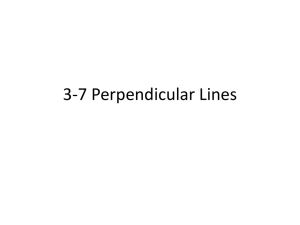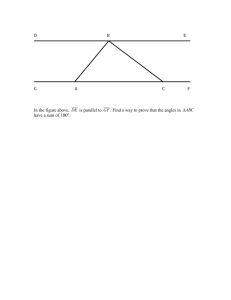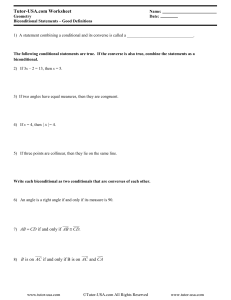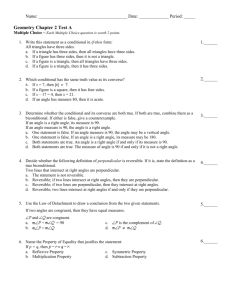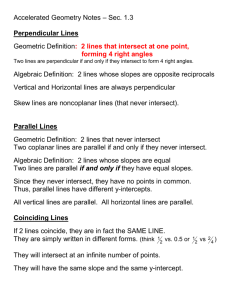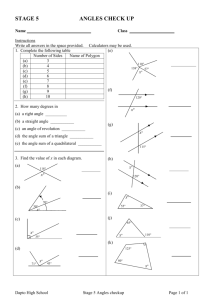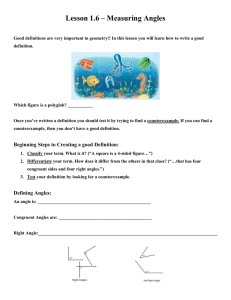Geometry Chapter 2 Test B Name:______________________________Date:___________________Period:__________
advertisement
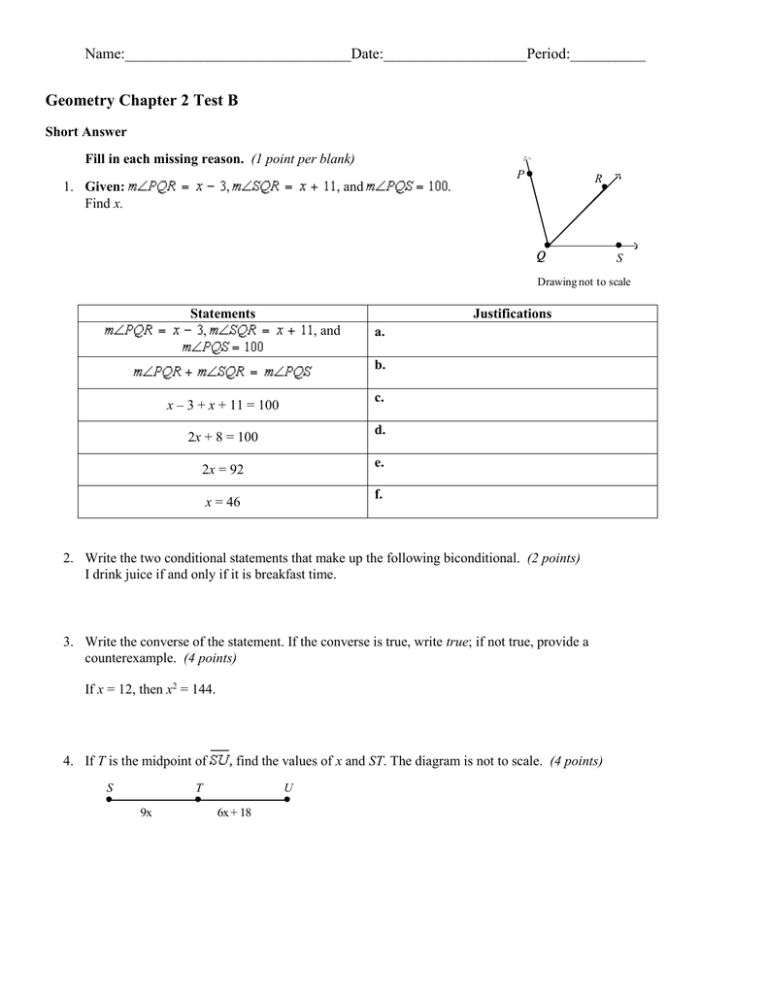
Name:______________________________Date:___________________Period:__________ Geometry Chapter 2 Test B Short Answer Fill in each missing reason. (1 point per blank) P 1. Given: Find x. , , and R . Q S Drawing not to scale Statements , Justifications , and a. b. c. x – 3 + x + 11 = 100 d. 2x + 8 = 100 e. 2x = 92 f. x = 46 2. Write the two conditional statements that make up the following biconditional. (2 points) I drink juice if and only if it is breakfast time. 3. Write the converse of the statement. If the converse is true, write true; if not true, provide a counterexample. (4 points) If x = 12, then x2 = 144. 4. If T is the midpoint of S find the values of x and ST. The diagram is not to scale. (4 points) T 9x U 6x + 18 Name:______________________________Date:___________________Period:__________ 5. Determine whether the conditional and its converse are both true. If both are true, combine them as a biconditional. If either is false, give a counterexample. (2 points) If two lines are parallel, they do not intersect. If two lines do not intersect, they are parallel. 6. Complete the paragraph proof. (1 point per blank) Given: are supplementary, and are supplementary. Prove: Statements are supplementary are supplementary _________________a. _________________b. Justifications Given Definition of supplementary angles c.____________________________ _______________d. ________________e. Subtraction Property of Equality Definition of congruence 7. A plumber knows that if you shut off the water at the main valve, it is safe to remove the sink faucet. The plumber turns the main valve to the “Off” position. What conclusion can the plumber make? (2 points) Name:______________________________Date:___________________Period:__________ 8. Solve for x. Justify each step. (6 points) Statements Justifications b. a. 2x – 14 = 82 d. c. f. e. 9. Name the Property of Congruence that justifies the statement: (2 points) B B . 10. Identify the hypothesis and conclusion of this conditional statement: (2 points) If two lines intersect at right angles, then the two lines are perpendicular. Vocabulary Match each word with the definition. (2 points each) 11. ____ Conditional A. If a = b and b = c, then a = c 12. ____ Hypothesis B. true or false answer to a conditional statement 13. ____ Conclusion C. A statement that you can prove true. 14. ____ Truth Value D. “then” part of the sentence 15. ____ Converse E. If a = b, then b = a 16. ____ Symmetric Property F. a conditional statement with the hypothesis and conclusion switched. 17. ____ Theorem G. “if” part of the sentence 18. ____ Transitive Property H. if-then statement Name:______________________________Date:___________________Period:__________ Multiple Choice ~Each multiple choice question is worth 2 points 19. Use the Law of Detachment to draw a conclusion from the two given statements. 19.______ If two angles are congruent, then they have equal measures. and a. b. are congruent. c. d. = + = 90 is the complement of 20. Write this statement as a conditional in if-then form: All triangles have three sides. a. If a triangle has three sides, then all triangles have three sides. b. If a figure is a triangle, then all triangles have three sides. c. If a figure has three sides, then it is not a triangle. d. If a figure is a triangle, then it has three sides. 21. Name the line and plane shown in the diagram. . 20.______ 21.______ T U S R a. b. c. line R and plane RSU and plane UR d. and plane UT and plane RSU 22. Find the value of x. 22.______ (8x – 6)° (7x + 8)° Drawing not to scale a. 106 b. 74 c. 14 d. –14 23. Name the Property of Equality that justifies the statement: If x = y, then . a. Division Property c. Symmetric Property b. Subtraction Property d. Transitive Property 23.______ 24. The supplement of an angle is 48°. What is the measure of the angle? a. 52° b. 132° c. 142° 24.______ d. 42° Name:______________________________Date:___________________Period:__________ 25. Are points C, J, and B collinear or noncollinear? a. collinear b. noncollinear 25._____ c. impossible to tell 26. Determine whether the conditional and its converse are both true. If both are true, combine them as a biconditional. If either is false, give a counterexample. If an angle is a right angle, its measure is 90. If an angle measure is 90, the angle is a right angle. a. Both statements are true. An angle is a right angle if and only if its measure is 90. b. One statement is false. If an angle is a right angle, its measure may be 180. c. One statement is false. If an angle measure is 90, the angle may be a vertical angle. d. Both statements are true. The measure of angle is 90 if and only if it is not a right angle. 27._____ 27. Which conditional has the same truth value as its converse? a. If a figure is a square, then it has four sides. b. If x = 7, then . c. If x – 17 = 4, then x = 21. d. If an angle has measure 80, then it is acute. 28. If scale. a. 54 and , then what is the measure of b. 56 c. 2 26._____ The diagram is not to 28._____ d. 52 29. Decide whether the following definition of perpendicular is reversible. If it is, state the definition as a 29._____ true biconditional. Two lines that intersect at right angles are perpendicular. a. Reversible; two lines intersect at right angles if and only if they are perpendicular. b. The statement is not reversible. c. Reversible; if two lines are perpendicular, then they intersect at right angles. d. Reversible; if two lines intersect at right angles, then they are perpendicular. Name:______________________________Date:___________________Period:__________ 30. Use the Law of Syllogism to draw a conclusion from the two given statements. If two lines intersect and form right angles, the lines are perpendicular. If two lines are perpendicular, they intersect and form 900 angles. a. If two lines do not intersect and form 900 angles, they do not form right angles. b. The lines intersect and form 900 angles. c. The lines are perpendicular. d. If two lines intersect and form right angles, they intersect and form 900 angles. Bonus Question (3 points) 23. Given: Prove: are complementary, and are complementary. 30.______ Name:______________________________Date:___________________Period:__________
